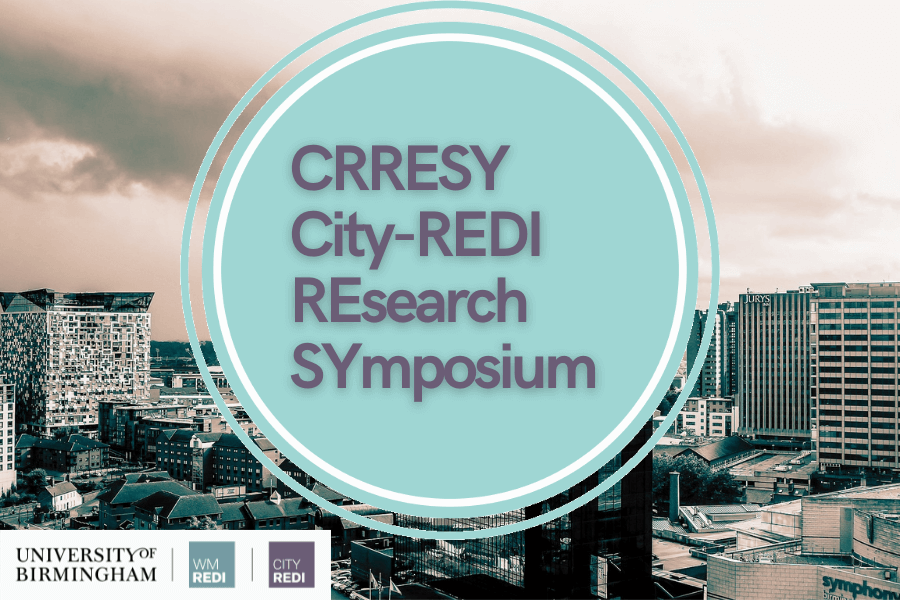
On May 12th 2022, City-REDI hosted its biannual research symposium. The online event had a range of presentations from City-REDI researchers showcasing some of the diversity of research in the Institute. This blog provides an over of research from the event and readers are encouraged to contact the presenters for more information.
Summary of projects
The university as a ‘just anchor’: universities, anchor networks, and participatory research
Liam O’Farrell, Dr Sara Hassan and Charlotte Hoole.



Abstract:
In this paper, we connect literature on civic universities and anchor institutions with the notion of visibility to explore how universities can play more engaged roles in their areas. We introduce the concept of ‘just anchors’, which are institutions with strategies to achieve local social and economic justice goals through collaboration in networks of other anchors and knowledge co-production with citizens. This paper is based on data from USE-IT!, an ERDF-funded programme that developed mechanisms to build social resilience in an inner-city ward of Birmingham. Our findings show that co-production empowers citizens and that universities are well-placed to facilitate and benefit from the outputs of this process. Based on the experience of delivering a community researcher training scheme, we reflect on the potential of universities to be more visible to, and facilitate the visibility of, marginalised groups, introducing a new theoretical concept into the literature on universities as anchor institutions. We also draw further lessons from USE-IT! to offer practice-based recommendations to other universities seeking to activate their role as just anchors.
Universities in a regional skills ecosystem: insights from the West Midlands, UK
Dr Abigail Taylor, Dr Sara Hassan & Professor Anne Green


Abstract:
The role of universities in education systems has been connected to regional economies in terms of market failures in the supply and demand for skills (Arbo and Benneworth, 2007). The mix of Higher Education Institutions has been shown to be an important factor shaping their engagement within different regional contexts (Boucher et al, 2003). However, extant literature tends to focus on either how universities contribute to economic development through their role in promoting innovation (e.g. Benneworth et al, 2017; Billing, 2020; Collinson, 2020; Etzkowitz, 2003; Harrison and Turok, 2017; Valero and Van Reenen, 2019) or their role as anchor institutions (e.g. O’Farrell et al, 2022; Konig et al 2020). Carrascal Incera et al (2020) have also emphasized the importance of student expenditure for regional economies. Although there is growing interest in graduate retention at regional and local levels, and a recent study has made a distinction between, and studied the geography of labour retention and entrepreneurial retention (Kitagawa et al., 2021), in general, less understanding exists of universities’ roles in enhancing skills ecosystems from a labour market perspective at the city and broader metropolitan scale.
This paper seeks to address this gap by examining the role of multiple HE and FE institutions in a regional skills ecosystem, providing insight into how universities and colleges in the West Midlands in the UK contribute to the region’s skills base and labour market (i.e. how universities are contributing to the composition of labour supply, upskilling, supporting individuals into employment, supporting businesses and attracting business investment). It is based on qualitative interviews with universities, colleges and regional stakeholders in the West Midlands metropolitan (3 LEP) area. The West Midlands represents an excellent case study due to the heterogeneity of the region and the universities within it. The focus of the paper is on experiences in a single region, but the issues raised are of relevance to universities elsewhere in the UK and internationally.
The paper first investigates the role that different colleges and universities in the region play in the skills ecosystem. Secondly, it identifies opportunities for universities to understand their role and support the levelling up agenda but reveals a series of internal and external challenges which universities face regarding taking these opportunities. Thirdly, it demonstrates how the Covid-19 pandemic has brought about changes in partnerships, competition and collaboration between universities. The paper concludes by discussing how these insights contribute to regional economic development theories and concepts.
Sentiment during the Covid-19 and consumption in China

Abstract:
Sentiment is regarded as an important driver of economic activity. Optimistic or pessimistic sentiment about the future could lead to increased/decreased economic activity. In this research, we obtained big data from Weibo, China’s largest social media platform, to construct a sentiment measure with machine learning natural language processing during the Covid-19 pandemic. We then examined determinants of sentiment and the possible effect of sentiment on various consumption outcomes.
Building bridges and providing direction: The role of “STEM assets” in innovation ecosystems
Dr Caroline Ioramashvili, Dr Magda Cepeda-Zorrilla and Professor Simon Collinson



Abstract:
This study focuses on what we call university-based “STEM assets”, which we define as physical facilities dedicated largely to the translation, development and transfer of scientific, technological or engineering innovation and knowledge and expertise which relates to new or improved business processes, products or services. These assets play an important role and the development of innovation ecosystems, and in turn in driving regional growth and development (Iammarino, 2005)
We focus on three STEM assets in the West Midlands region of the United Kingdom and use a mix of semi-structured interviews and quantitative analysis, to understand the role of STEM assets in:
- Bringing together academia and industry, facilitating knowledge exchange;
- Addressing regional skills shortages; and
- Setting local priorities, strategies and agendas.
Our findings indicate that STEM assets are an important magnet for bringing talent into the region, contributing to a deep pool of highly skilled labour that makes the region attractive to other businesses. In-house skills are also made available to other businesses through joint research projects, contract research and consultancy services.
The paper contributes to the literature on university-industry collaboration, focusing on STEM assets’ role in the production and distribution of knowledge and development of the local skills base. The research contributes to policy discussions on improving productivity, in particular in lagging regions, through investments in R&D and innovation ecosystems. We identify STEM assets as important actors to further this agenda, as they are well placed to align incentives and bring different parts of the system together.
References
Iammarino, S. (2005). An evolutionary integrated view of regional innovation systems: concepts, measures and historical perspectives, European Planning Studies, vol. 13, no. 4, 497–519
What works: Conducting impactful virtual internships as a civic university
Hannes Read, Connor McFadden and Elizabeth Williams

Abstract:
The progression to a virtual way of learning will be part of teaching and learning in the future. City-REDI/WMREDI, University of Birmingham have developed a toolkit to evidence ‘what works’ when conducting virtual internships with internal and external partners. Virtual internships are a novel form of knowledge exchange and provide a learning opportunity for not only students, but employers, university staff and departments, and place. Conducting internships online can help build key professional connections for students who may have previously been unable to travel or find time to work. In addition, virtual internships can provide valuable support for businesses and existing employees who benefit from the multifaceted knowledge exchange between university, business, student, and place. The toolkit draws on insights and empirical findings from a series of focus group discussions conducted with students, employers and external stakeholders. The toolkit highlights the importance of communication, planning, mentorship and feedback in conducting virtual internships. Future partners can use the toolkit to maximise the impacts on students, staff, university departments, external partners, and place.
Evaluating a Person-centred Start-up Accelerator
Max Nathan, Gonzalo Nunez-Chaim, Henry Overman, Capucine Riom, Dr Juliane Schwarz and Olmo Silva

Abstract:
Recent years have seen rapid and extensive growth of business accelerator programmes, both in the UK and in other OECD countries. Such programmes are claimed to have large positive effects on entrepreneurship, innovation and business growth for participating companies. However, there is a lack of robust evidence on actual programme effects and how these are achieved. For example, highly selective programmes may choose firms that would have succeeded without business support. Given that many programmes now benefit from public support, understanding impact is important.
In this paper, we report on an ongoing multi-year, mixed methods evaluation of an accelerator programme in London, run by one of the UK’s leading providers. The programme aims to support 150 competitively selected start-ups and early stage companies in the creative and tech industries over 3 years. It takes a ‘person-centred’ approach, supporting new entrepreneurs in their initial journey towards business success through an intensive 3-month programme of mentoring, technical advice, networking and peer feedback tools. It aims to raise participant firms’ survival, employment and innovation, as well as raise founders’ leadership skills and confidence.
We report emerging findings from the evaluation, drawing on rich programme management data, participant surveys, interviews with participants and programme managers as well as secondary data on post-programme outcomes. We focus on 1) participants’ experience of the programme 2) changes in their behaviour during and after the programme and 3) changes in business outcomes.
Understanding the 2020 shock in the UK Automotive Sector: A multi-region input-output approach
Abstract:
The automotive industry is an important part of the UK national economy with an estimated £78.9 billion in turnover and £15.3 billion in GVA and supporting over 800,000 jobs in 2019 (SMMT, 2021). Both Covid-19 and Brexit implementation have disrupted production, demand and trade for industries throughout the automotive supply chain. In the UK new car production is down -29.3% in 2020 and -28.7% in 2021 compared to 2019. Representing the lowest levels of car production since 1984 (SMMT, 2022).
This paper uses a hypothetical extraction method in a multi-region input-output (MRIO) model to estimate the economic impact of the so-called ‘2020 shock’ in the three identified automotive clusters.
Optimising Regional Creative Clusters
Dr Matthew Lyons & Dr James Davies


Abstract:
The Creative and Digital industries are a source of high value, consistent growth in goods and services for exports and providing skillsets that have increasing applicability to other sectors. As the first part of a multi-stage project considering the role of Higher Education in optimising creative clusters in two growing regions in the UK, this presentation provides a comparison of the creative clusters in both the West Midlands Combined Authority (WMCA) and the Cardiff Capital Region (CCR).
TV and Film (CCR), Video Games and IT (WMCA) are high-growth, with great potential for cross-collaboration with other high value-added sectors (aerospace, automotive, medical science etc.), but are suffering from serious skill shortages and gaps in experienced positions. Universities can help address these skills gaps, but face pressures, both internal and external, that can act as a barrier to contributing fully to their regional civic mission.
The Levelling Up white paper has placed a great deal of focus on regional policymaking, but the wider civic mission of universities within their regions was largely omitted. HEIs have a role in boosting their local creative clusters, yet our analysis shows there are key questions that need to be answered. Though the creative sector has been a key element of British economic policy for the last two decades, it has suffered from an uneasy relationship with HE, lacking the confidence of HE/FE to provide appropriate and up-to-date skillsets. Are universities being pulled in too many directions? More information is needed on what, specifically, can be achieved through a collaboration of HE/FE and colleges and industry, to help close these gaps and ensure both the WMCA and CCR and their creative industries are adequately supported.
